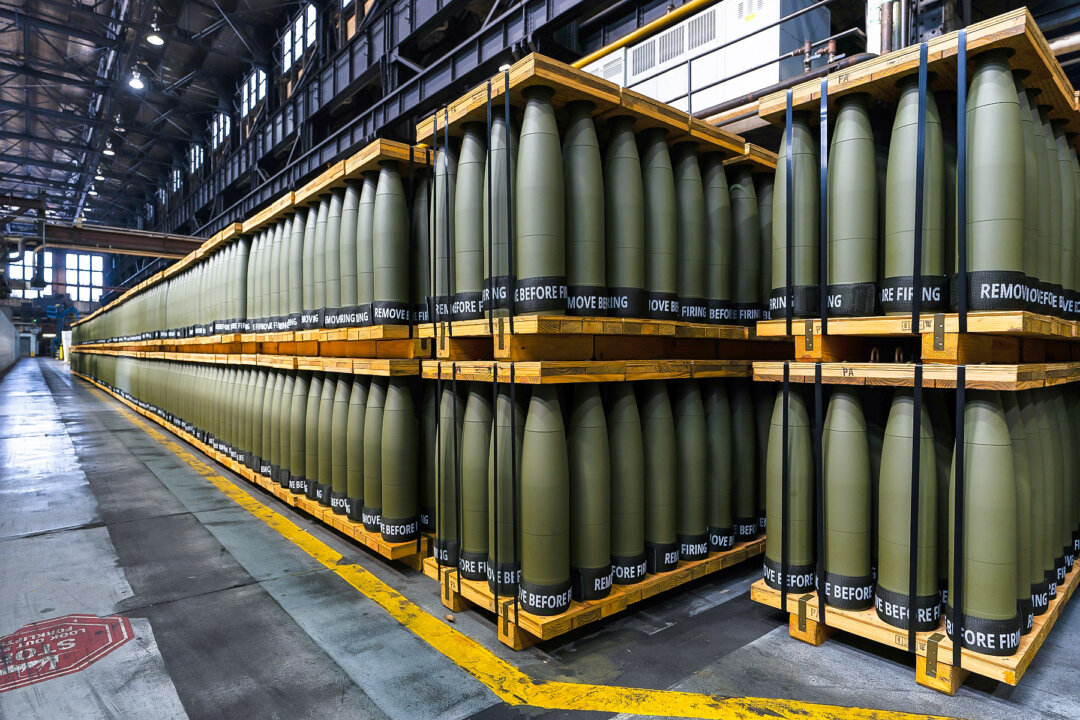National security adviser Jake Sullivan said that the nation’s ability to replace munitions could not move quickly enough in wartime.
The United States’ ability to replenish stockpiles of critical munitions is still insufficient for deterring a war with China’s communist regime, according to a senior White House official.
National security adviser Jake Sullivan said on Dec. 4 that the nation’s ability to replace munitions could not move quickly enough in wartime, as demonstrated by weapons shortages following Russia’s invasion of Ukraine.
“The American arsenal of democracy was fundamentally under-equipped for the task at hand,” Sullivan said during a talk at the Center for Strategic and International Studies (CSIS) think tank in Washington.
Sullivan said the nation’s inability to quickly produce munitions at scale was detrimental to its ability to deter conflict abroad and that steep changes were still needed.
“Our industrial capacity simply wasn’t there. We lacked supplies and critical precursor materials,” Sullivan said.
“The deeper we looked, the clearer it became that we needed larger stocks of many critical munitions and weapons platforms, both to maintain U.S. readiness and to equip a partner under attack.”
Sullivan said that in the early phases of the Russia–Ukraine war, the United States had struggled to expand its production of 155 millimeter (mm) artillery shells by even an extra 400 units per month.
Following two years of extensive funding and manufacturing initiatives, he said, the United States has increased its shell production by almost 400 percent to 55,000 units a month, a number that is expected to increase again to 100,000 by 2026.
The war in Ukraine demonstrated profound weaknesses in the U.S. defense industrial base, with Ukraine expending on some occasions what were believed to be a year’s worth of 155 mm rounds in as little as eight weeks, Sullivan said.
Military leaders have been concerned for some time that widespread shortages could grip the United States’ reserves. Last year, Army Secretary Christine Wormuth said that U.S. munitions production capacity was at the “absolute edge.”
Other U.S. leaders have expressed concern that the nation won’t be able to adequately respond to contingencies in other theaters, such as the Indo–Pacific, including a Chinese invasion of Taiwan or a North Korean attack on South Korea.
Likewise, a report by the CSIS last year found that the United States could exhaust key munitions in a war over Taiwan in less than a week of open war with China.
To that end, Sullivan acknowledged that China’s single-largest advantage over the United States was the scope of its manufacturing base and its corollary ability to create munitions and weapons platforms en masse.
A war with a major power such as China, he said, could erode U.S. munitions stockpiles very quickly indeed.
“God forbid we end up in a full-scale war with the PRC,” Sullivan said, using an acronym for the official name of communist China, the People’s Republic of China.
“But any war with a country like the PRC, a military like the PRC, is going to involve the exhaustion of munitions stockpiles very rapidly.”
Likewise, he warned that China was working together in unprecedented ways with Russia, North Korea, and Iran and that the four powers were now sharing technology and expertise to undermine the United States and its allies.
“We are seeing concerning flows of capability and knowhow among these various actors,” Sullivan said.
“Our adversaries and competitors are taking more risks. And importantly, they’re working together to strengthen each other’s defense capacity.”
To contend with the threat, Sullivan said that the United States would need to continue expanding and modernizing its defense industrial base and deploying commercial-first technologies such as drones to shore up any weaknesses in its deterrence efforts.
Concluding that “industrial might is deterrence,” Sullivan said that the next administration and those that follow should continue to boost munitions production, create factories and supply lines for weapons systems, and increase the manufacture of precursor materials for those supply chains.
The ability to regenerate the nation’s stockpiles is just as vital before a conflict as it is during one, he said.
“I’m not here to report that the job is finished. I’m here to report the job has started, and now it needs to continue in a big and sustained and bipartisan way,” he said.

